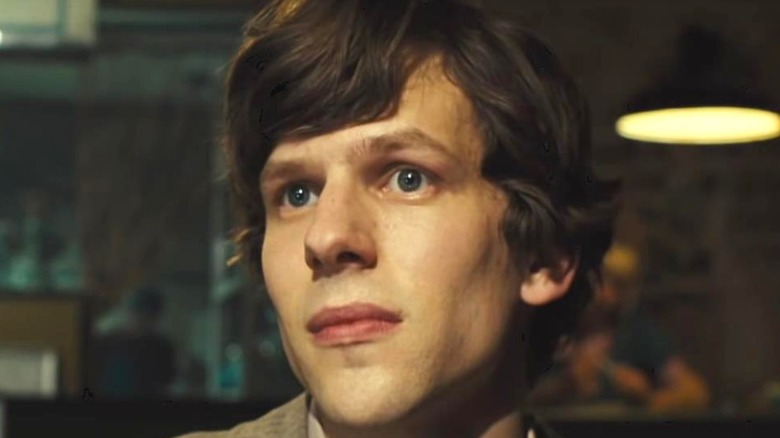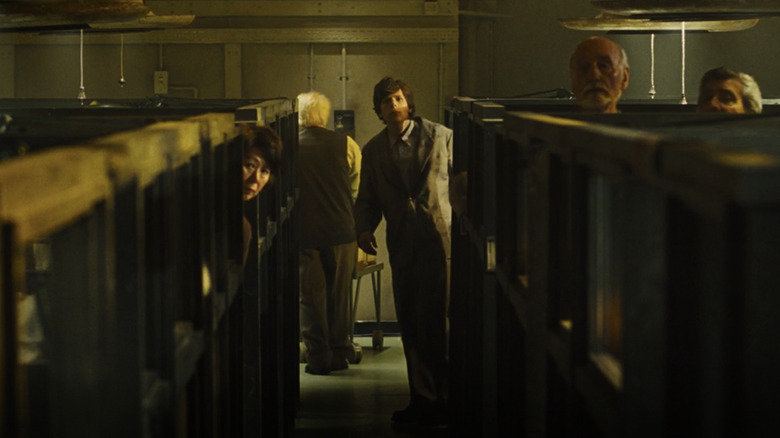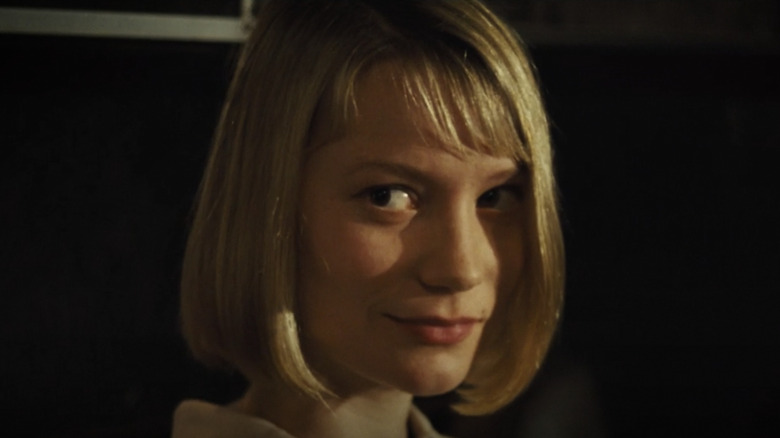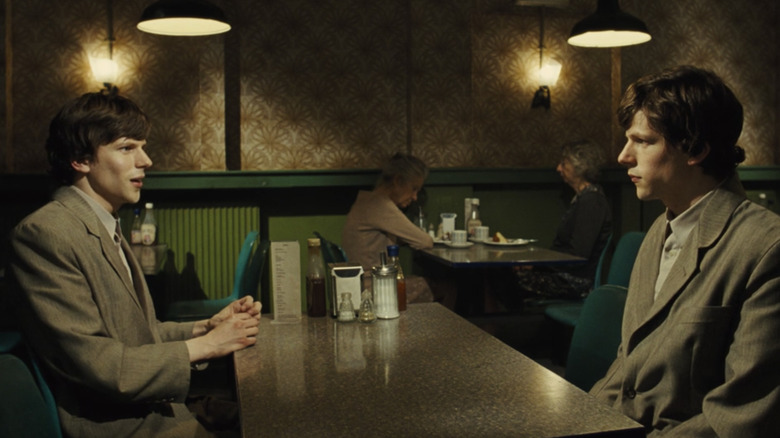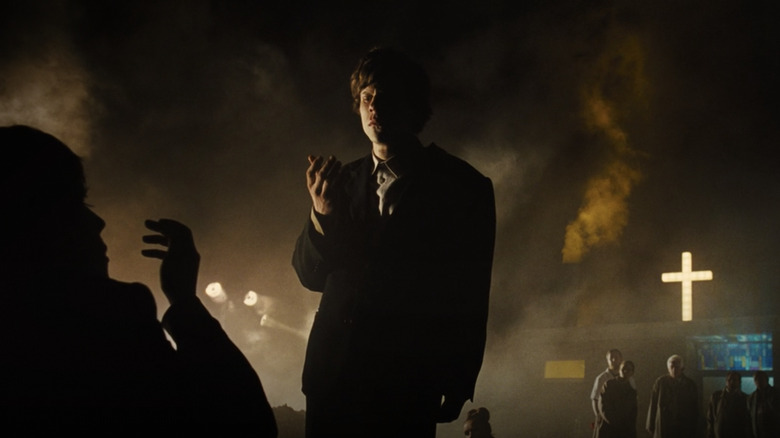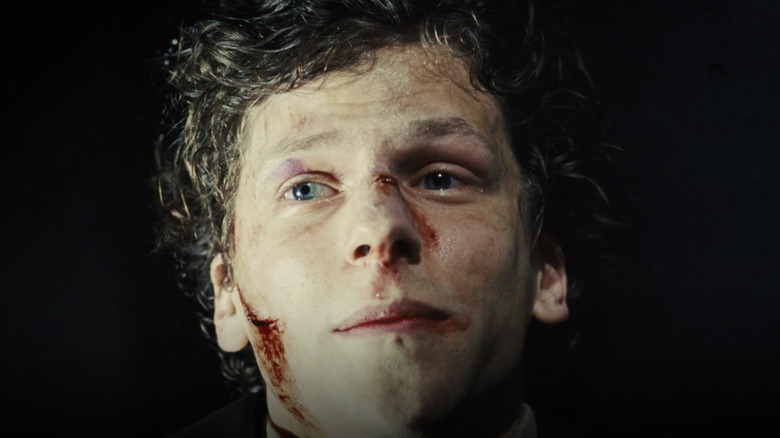The Ending Of The Double Explained
English filmmaker and actor Richard Ayoade's 2013 darkly comical film "The Double" is loosely based on the Fyodor Dostoevsky novel of the same name. The film is a dystopian satire in which its main protagonist, Simon James (Jesse Eisenberg), lives a meaningless and dreary existence while working at a government job where he is neither valued nor recognized (quite literally). Simon's world is thrown into a frenzy when his cooler, devious, and bold doppelgänger (coincidentally named James Simon and also played by Eisenberg) appears, causing a storm of chaos in his life.
Ayoade's starkly creative and dramatically exaggerated interpretation of Dostoevsky's novella paints Simon as a down-on-his-luck character where nothing goes right in his world. He is even too shy to speak to the woman of his dreams, a charming and unconventional girl next door type, Hannah (Mia Wasikowska), with whom he works (and occasionally spies on). Simon doesn't exude an ounce of courage to stand up to his clueless and oafish boss, Mr. Papadopoulos (Wallace Shawn), who keeps referring to him as Stanley.
Simon's reality couldn't get any more uninteresting and predictable, then his suave alter-ego, James, all of a sudden takes over everything Simon once knew. The twisted ending to Simon and James' story had us asking many questions ourselves: Was James just a manifested figment of Simon's imagination? Who ultimately survives? Does Hannah end up with Simon? Here's the ending of Richard Ayoade's "The Double" explained.
Simon exists in a world that doesn't care about him
Mechanized noises, typing, and electronic sounds encompass the sterile, cold, Orwellian-style office environment which Simon tolerates every miserable day. The dictatorial setting and uninviting mise-en-scene show the workers in their separate cubicles, disconnected from their coworkers and focused on dull, meaningless tasks. Primarily neutral tones consisting of browns, blacks, grays, and whites demonstrate the distinct lack of color and life that exists not only within Simon's world but everybody else's as well.
In the film, people act like robots and don't really feel anything. The citizens of the nondescript town and location are numb to a society that has primed them for a life of subservience and dedication to the system, and to a Big Brother-type figure named the Colonel (James Fox) who runs the whole operation. There's a scene in which Simon is watching a creepy television ad with his aging mother (Phyllis Somerville), where a floating voice recites, "The Colonel will show you people in a way your business can understand because the Colonel knows there's no such thing as special people, just people."
Simon is a "non-person" to his co-workers and his mother, who doesn't even want to hear him speak. He may as well not exist, considering he's residing in a society that doesn't value or acknowledge the uniqueness of individuality, one where being a faceless, nameless sheep in a herd is the accepted norm.
Loneliness is a common theme
As Simon performs his nightly routine of peering through his telescope, he witnesses a man jumping off of the high-rise building across from him right after he waves at him. Simon then calls two smart-talking and inappropriately candid local detectives who only investigate suicides that occur in their city. He peers up at where the man ended his life, and as Hannah walks up to him, he tells her, "It's terrible to be alone too much."
At a local diner, Simon and Hannah start talking about the man who jumped (who sounds a bit too much like Simon), with Hannah revealing that the man had been stalking her and she even confronted him about it. She wonders if maybe there was a connection between her outburst at him and his subsequent death. She says, "A person can get really sick of just floating by." Their loneliness is bounded by the fact that they can't relate to anybody around them.
Things start to feel more promising for Simon in regards to his chances with Hannah — as if he's gotten a new lease on life. A cheery song plays while a montage unfolds of Simon dancing and buying a pair of vintage earrings for Hannah. As Simon shows up to the Colonel's mandatory ball that all employees must attend, his employee ID card won't work (a repeated occurrence that is shown throughout the film) and that means he can't enter. He peeps through a hole in a door and sees Hannah waiting by herself. Although Simon asserts that he's worked for the company for seven years, he is suspected to be trespassing and gets escorted out of the building, given that nobody recognizes him. Simon's ghostlike anonymity continues to be prevalent in the story and its plot.
If you or anyone you know is having suicidal thoughts, please call the National Suicide Prevention Lifeline at 1-800-273-TALK (8255).
The mysterious appearance of James Simon
Things in Simon's life continue to go downhill. The out-of-the-blue manifestation of Simon's uncanny double, James Simon, rapidly propels the plot. Nobody else seems to notice that they have the same face, and, in a scene with Simon's unenthused coworker named Harris (Noah Taylor), Simon has to ask him if he and James have the same face. Harris responds with an unconvincing, "Suppose so" while further remarking that Simon is "pretty unnoticeable." James, on the other hand, is a cocky, arrogant, and uber-confident version of Simon. Simon goes to his usual diner spot with James and can't even order without stumbling on his words. James demands that the waitress make him some eggs even though they don't serve breakfast at night.
Serving as a mentor-of-cool to Simon, James tries to help him get a date with Hannah. Of course, James ends up sabotaging the entire effort, taking Hannah home with him instead. Throughout the rest of the film, this sabotaging continues to happen not only with Hannah but with Simon's work, too. James takes credit for Simon's reports and even threatens that he'll blackmail Simon by showing explicit photos of him (who is actually James) fooling around with Mr. Papadopoulos' daughter, Melanie (Yasmin Paige). Fearful of losing his job and unable to stand up to his bully, Simon backs down until he's forced to come to a breaking point.
Simon finally confronts his double
Towards the conclusion of the film, Simon receives a message on his answering machine from a doctor. The doctor says that his mother has passed away from a "cerebral occurrence" and that her only wish is to be buried at night at a cemetery near her home. The death of Simon's rather unloving mother signals that he is alone, now more than ever. With his mother dead, it would seem that he finds the courage to deal with his inner demons and summons the courage to kill James. In a riveting and gloomy tracking shot, Simon runs through a forest to the cemetery only to find that James is already there. Simon punches James, but shortly after this, a priest knocks Simon out with a shovel into his mother's empty grave. Simon wakes up, runs to his apartment, and sets up an elaborate scheme to end James' torturous reign once and for all.
The symbolism of the crucifix in the graveyard scene symbolizes the unholy self that Simon manifested. As Simon yearns to cleanse himself of the impurities his double dredged up, the "sins" that James has placed on his repressed consciousness bear too heavy of a weight. It could be inferred that Simon's desire to be pure and cleansed of James' evil allows him to recognize and come to grips with his own mortality, while also pondering the weight of his existence in relation to the world around him.
Finding meaning in the meaningless
While James is sleeping, Simon handcuffs him to his bed. Simon jumps from the building and Hannah rushes to his tragic remains. Sirens approach in the distance and the camera cuts to James' lifeless body on the ground, clearly mimicking the identical connection to Simon's body and soul — which is very similar to the Narrator's subconscious creation of Tyler Durden in "Fight Club." The final scene is what we can assume to be Simon picturing what it's like to be in heaven, seeing both Hannah and the Colonel in the ambulance with him. The Colonel asks him, "There aren't too many like you are there, Simon?" Smiling, Simon responds with, "I'd like to think I'm pretty unique."
Although the ending hints at a few far-fetched possibilities, it could be inferred that Simon unconsciously created James as a way of coping with his lack of confidence and a practically nonexistent sense of his place in a coldhearted, indifferent society. Furthermore, the only way that Simon's double would cease to exist was for Simon to confront his tormentor (himself), thus ending his life. Per Decider, "The one thing that Simon James has is his identity, but once that's stolen from him he has nothing." Richard Ayoade's richly idiosyncratic and metaphorically complex film comments on superficial societal expectations, finding meaning amidst life's absurdities, and taking a deeper look at the hidden parts of ourselves that we aren't even aware are there.
